As Benedict XVI, Joseph Ratzinger was head of the Catholic Church from 2005 to 2013. Using archival footage and conversations with contemporary witnesses, this film provides insight into the rise and fall of the German pope.
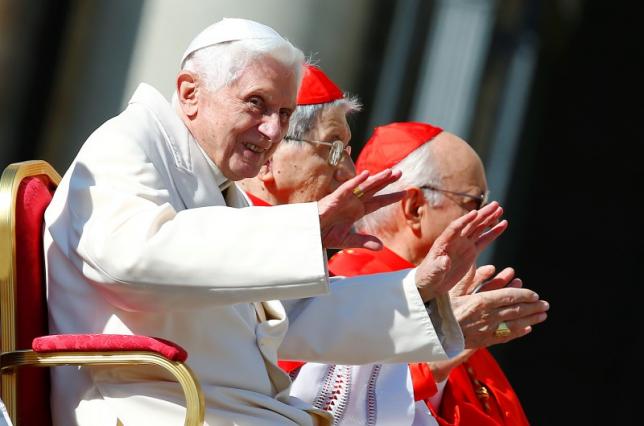

Alliance, Support & Activism

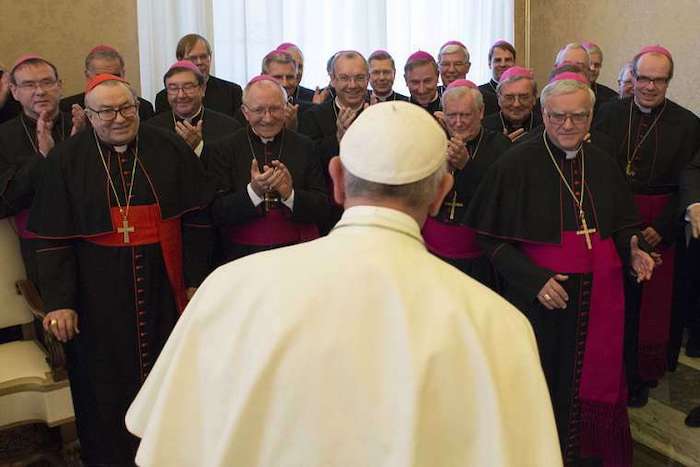
By Claire Giangravé
At last month’s Pride parade in Rome, members of the city’s LGBTQ community waved rainbow flags, strewed glitter and generally exuded love to fellow marchers and those along the route. When they occasionally showed flashes of ire, their mockery and ridicule were aimed at some of Rome’s most familiar figures: Pope Francis and the Vatican hierarchy.
Some shouted at the churches they passed; others held sparkly signs with double-entendres aimed at the pontiff. Still others strutted their stuff dressed as Francis himself.
What angered Italian LGBTQ citizens was what they considered undue interference by the Vatican in its attempt to stall a controversial bill being debated in the Italian Senate that would criminalize homophobia. Named for its author, politician and activist Alessandro Zan, the bill would also institute a day aimed at raising awareness of sexuality and gender issues in schools.
Italian bishops have twice voiced their concerns about the Zan bill, claiming it would violate the religious freedom of Catholic schools, hospitals and other institutions. When that admonition fell on deaf ears, the Italian bishops’ conference sent a diplomatic note to the Italian government on June 22. The Zan bill, the bishops argued, violated the accords signed in 1929 between Italy and Vatican City, known as the Lateran Treaty, that set expectations for mutual noninterference.
In the middle of this heated debate, Francis sent a letter to the American Jesuit priest James Martin, about Martin’s efforts to promote inclusivity and to welcome LGBTQ individuals in the church.
“Our Heavenly Father comes close with love to each one of his children, each and everyone,” Francis wrote in the letter, praising Martin’s work.
Ever since Francis answered a question about a gay priest in 2013 with his own now famous question, “Who am I to judge?,” many Catholics have hailed the pontiff as a beacon of hope for LGBTQ inclusivity.
But while Francis has often shown in his words and personal acts of charity that he is close to LGBTQ individuals, the Vatican as an institution has done little to recast its hard doctrinal line, which views homosexuality as sinful and as “intrinsically disordered.”
“I can understand that it’s very confusing for people,” said Juan Carlos Cruz, a clerical abuse survivor and member of the LGBTQ community who frequently meets with Francis at the Vatican.
Despite the Vatican’s recent interference on the Zan bill, “that’s not who Pope Francis is,” Cruz said, adding that in private conversations the pontiff makes it clear that not only did God make the activist gay, but loves him the way he is.
Cruz made it clear that while he enjoys a personal relationship with the pope, and while Francis appointed him to the Pontifical Commission for the Protection of Minors in 2020, he is not a papal spokesperson.
Jamie Manson, president of Catholics for Choice and a longtime activist for LGBTQ rights in the Catholic Church, believes that Francis “wants to be compassionate and merciful to marginalized people — he sees us as marginalized people — but he doesn’t want to change the teachings that will free us from marginalization and get us justice.”
Catholic LGBTQ organizations are divided, Manson explained, between those who believe that “appealing to mercy and pulling at heartstrings” will lead to change in the Vatican and those who “have run out of patience.”
Occasionally the pontiff’s statements on homosexuality seem to contradict themselves. He has personally supported LGBTQ individuals in Italy and in Argentina — and last September, speaking to Italian parents of LGBTQ children, Francis said that “God loves their children as they are” and so does the Catholic Church. But he has also criticized gender theory, comparing it to nuclear weapons and calling it a form of ideological colonization.
The dynamic can be attributed to a “hate the sin, not the sinner” approach, but according to Cruz, it also suggests that there is not a little opposition to Francis’ support for LGBTQ Catholics among Vatican officials.
“I’ve never seen in my life a more political and LGBTQ-obsessed Curia,” he said. “It is sad to see how much Pope Francis wants to support and open his arms to the LGBTQ community and how much they put land mines in his path to be able to do it,” he added.
Concerning the CDF’s ban on the blessing of same-sex couples, which occurred shortly after Francis returned from his historic trip to Iraq, Cruz said he believes that “in some way (the pope) is going to try to repair the harm that document did.”
The CDF document, approved by Francis, seemed to be an attempt to rein in the discussions taking place in Germany known as the Synodal Path — a series of conferences involving local bishops and laity that has taken a progressive line on questions regarding sexuality and power structures in the Catholic Church. But LGBTQ Catholics in other countries regarded it as a gratuitous slap, and despite the ban from the Vatican, some German clergy have continued to bless same-sex couples.
Manson praised the pope for opening the conversation on LGBTQ issues in the church, which she believes has led to “meaningful change,” but she added that the time for talk is over. She called for the pope to meet with members of the LGBTQ community at the Vatican and publicly acknowledge his private statements on LGBTQ issues.
Cruz said that he known he’s “lucky” to be able to speak to the pope directly on these topics, praising Francis’ efforts to evolve the Vatican’s understanding of LGBTQ individuals, while adding that “we cannot change church teaching in a minute.”
He also longs for the pope to speak openly on these topics, he said, and for him not to “let others define it for him.”
Complete Article ↪HERE↩!

By Chico Harlan and Stefano Pitrelli
The Vatican has taken a highly unusual step against its neighbor, sending a diplomatic note to the Italian government that protests a draft law aimed at preventing hate and violence against LGBT people.
The complaint marks a formal effort by the Vatican to influence Italian lawmaking and could provide a test for how forcefully the church can exercise its clout on culture war issues — not just as a religion but as a state.
While it’s common for church figures to take stances on affairs in other countries — whether on same-sex marriage, LGBT rights or abortion — in this case the Vatican is invoking its prerogatives as a nation, arguing that the law, if passed, would violate the “concordat” that provides the framework for its relationship with Italy.
“Some current contents of the draft being debated by the Senate reduce the freedom granted to the Catholic Church,” the Vatican’s note said, according to the Corriere della Sera newspaper, which first reported the letter.
The Vatican’s press office confirmed that the city-state sent a note to the Italian ambassador to the Holy See last week but did not provide more details. Benedetto Della Vedova, an Italian foreign ministry undersecretary who has read the document, called the message “heavy interference” and said the Vatican city-state had not previously attempted to influence the Italian government on highly contentious issues such as abortion and divorce.
“The effects of this escalation aren’t positive for anyone,” Della Vedova said. He declined to share a copy of the letter with The Washington Post, but he described the core of the Vatican’s contention — that the draft law would violate specific aspects of the concordat dealing with religious freedom and freedom of expression. The Vatican’s goal is to have the draft bill amended.
The law, known as the Zan bill, after gay activist lawmaker Alessandro Zan, was approved last year by Italy’s lower house and has since been under debate in the Senate, amid fierce national discussion. The bill would explicitly categorize violence against LGBT people as a hate crime, making it akin to racial or antisemitic attacks, while establishing harsher penalties than those currently on the books.
Members of far-right political parties have said the legislation would suppress opinion. The leader of the far-right League, Matteo Salvini, said it would punish those “who think a mom is a mom and a dad is a dad.”
Advocates say that the law would merely put Italy in line with other Western European countries and provide belated safeguards after a series of murders and assaults targeting transgender people. According to Rainbow Europe, an LGBT association, Italy provides some of the weakest legal protections on the continent for LGBT people.
The explanation for that is based partly on the Catholic Church’s deep historical influence on Italy. When Italy was first considering granting legal rights to same-sex couples, the powerful Italian bishops’ conference sponsored protests, and Pope Benedict XVI helped lead a campaign to stop it. (When Italy approved civil unions in 2016, Pope Francis took a more hands-off approach.)
But even though Francis has at times signaled a more welcoming church stance on homosexuality, the church has not shifted its official teachings and laws. In March, the Vatican made explicit its position that priests cannot bless same-sex marriages. The church has also taken a clear stance on gender issues and said in 2019 that people do not have the right to choose their own gender.
The Zan law provides protection to people based on gender identity, among other factors.
Crux, a Catholic news outlet, noted Tuesday that Francis has called gender theory “dangerous” and an example of evil at work.
“It is an attack on difference, on the creativity of God and on men and women,” the pope said in a book released last year.
But supporters of the Italian bill say the Vatican, even if concerned about the changing cultural perception of sexuality and gender, should not feel threatened by the proposed law. They note that any viewpoint is protected, as long as it does not “incite a concrete danger of discriminatory or violent actions.” They also note that the law will not force any school — including private Catholic ones — to participate in events teaching about transphobia and homophobia.
“The worries here are absolutely groundless,” Zan, the lawmaker, said in a phone interview.
Gabriele Piazzoni, secretary general of Arcigay, Italy’s largest gay rights group, said the church was perhaps more worried about public opinion — and the fact that some Catholics disagree with church teaching. According to the Pew Research Center, 75 percent of Italians say homosexuality should be accepted, a proportion lower than in other Western European countries but slightly higher than in the United States.
“The dissonance I see is between this kind of behavior by the Vatican and the majority of the Catholic world and of Catholic public opinion,” Piazzoni said. “Maybe they are afraid that the [Catholic school] students, parents and teachers may be the ones asking to hold initiatives against discrimination or violence. There could be a groundswell of requests that they want to prevent at all costs.”
Complete Article ↪HERE↩!
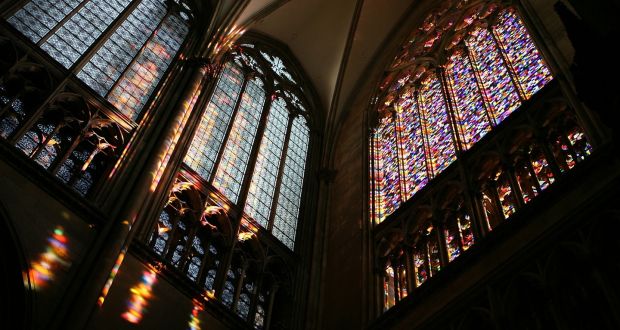
By Derek Scally
On a sunny Sunday evening in May, 80 people gathered in a Berlin church for a calm Catholic revolution. At 6pm the 11 metre-high wooden doors of the modernist church of St Canisius were opened for an inclusive Mass of blessing. Spaced out in pairs around the airy church were mainly same-sex couples, all looking ahead at the lanky Jesuit priest.
With expectation in the air, Fr Jan Korditschke removed his face mask and, wearing a broad smile, spread his arms and invited all present to join him in celebrating love. His sermon drew on John’s Gospel, that love is from God, and that it is not in the purview of a priest or a pope to deny the God-given blessing of love.
“God is present in love and and loving couples are already blessed with the presence of God. I am just giving it a framework through this rite,” he said.
Afterwards, with two assistants Korditschke worked his way through the church, talked briefly to each couple before praying together. Behind medical masks many tears flowed.
“It was such a relief, like a stone was rolling away from my heart,” said one man, Georg, alongside his partner afterward.
The Berlin Mass was the last in a series of services across Germany under the banner #liebegewinnt – love wins. The services were triggered by a Vatican document from March restating Catholic teaching that homosexual acts are disordered and blessings for same-sex unions are impossible.
One attendee, Robert, said he came with his partner in protest at the document’s key sentence that “God does not and cannot bless sin”. “By posing a question no one asked, just to answer it in such cold language,” he said, “Rome tried to ram home its point but have triggered a reaction they didn’t expect.”
A few feet away 15 young men and one middle-aged woman held a large hand-written banner reading “God cannot bless sin” and recited the rosary during the Mass. One protester, who declined to give his name, said that obedience to papal teaching is what has held the Catholic Church together for two millennia.
“I worry that carry-on like this,” he said, with a nod to the emerging massgoers, “will bring us toward another schism.”
Exactly 500 years ago, the renegade Augustinian monk Martin Luther was ordered in public to submit to this absolute papal authority by recanting his claims of corrupt church practice and flawed teaching.
Luther turned the tables on Rome by demanding they prove that his scripture-based understanding of the Christian faith was false. The confrontation spiralled and his challenge became a channel for a host of political and modernising forces. Western Christianity split and the world was never the same again.
History doesn’t repeat itself; in a largely secular Europe, most people would struggle to spell schism, let alone see any relevance for their lives. Still, something is brewing in the land of the Reformation as individual protests within the church of Rome feed into each other to create a crackling, Catholic conflagration.
German bishops appear unsure like never before as to where their loyalties lie. Should they deploy the Roman fire blanket, suffocate the flames and denounce critics as arsonist apostates? Or does their survival hinge on embracing the protest and facing down Rome?

Like their Irish colleagues, the German bishops’ fumbled response to clerical sexual abuse allegations and their cover-up in the past decade has drained away credibility and public support.
Nowhere is the struggle more visible – or the stakes higher – than in the western city of Cologne. For centuries its hulking Gothic cathedral has been a touchstone of German Catholicism. For many German believers, though, Cologne is now the epicentre of institutional dysfunction and denial, in particular over the scale of clerical child abuse and the systematic nature of its cover-up.
Last year Cologne’s conservative archbishop, Cardinal Rainer Maria Woelki, came under fire for suppressing a report he himself commissioned into clerical sexual abuse. A replacement report followed this year and triggered two bishops’ departure, but critics say this document was careful to avoid any analysis of whether church structures were a contributory factor to abuse. Tensions continue to build.
In January a local priest, Klaus Koltermann, wrote to Cardinal Woelki, warning of “disquiet among the greatest believers” in his parish of Dormagen, 20 minutes north of Cologne. When a local newspaper reprinted his letter, Koltermann’s superiors warned of “possibly serious breaches of your service obligations . . . that could have consequences”.
The threat was withdrawn when the priest went public with their correspondence, a stand-off he describes as a learning experience. “A new solidarity has to grow amongst us,” he told The Irish Times. “We have to become more courageous. Sadly, we priests never learned to stand up for our faith – in the church.”
Such cases of conscience-led insubordination are gaining momentum. Two weeks ago Catholics at an ecumenical gathering with Germany’s Lutherans held joint eucharistic celebrations in defiance of their bishops.
This week a parish in Düsseldorf wrote to Cardinal Woelki disinviting him as celebrant at their confirmation Mass next month. Woelki once served as a deacon in the parish, as did two abusing priests. In their letter, some 140 parishioners said they feared the cardinal would “instrumentalise” their children’s confirmation to hit back at his critics.
“You are for us, sadly, no longer credible, we have lost our trust in you as a bishop,” they wrote.
Unlike in other countries, German Catholics have a clear way to express a vote of no-confidence with the Kirchenaustritt (church departure). All Christian church members in Germany automatically pay a so-called “church tax” in a system dating back to the 19th century, calculated at 8 per cent of their income tax. Effectively a membership fee, it earns Germany’s Catholic Church some ¤6 billion annually. Revoking the payment is seen as revocation of church membership.
The number of annual departures in 2019 was 218,000, twice the number of a decade ago. Numbers for 2020 have yet to be collated but, based on anecdotal evidence, the ongoing abuse debate has prompted an unprecedented rush for the exits.
Already facing a ticking demographic time bomb, Catholic bishops announced a “synodal process” in 2019 to discuss the road ahead. With 230 members (lay and religious) discussions are under way in four groups examining the role of priests, church power, sexuality and women in ministry. The pandemic shifted discussions online but organisers hope in-person gatherings can begin from September, with the first votes on proposals by Christmas.
For Bishop Georg Bätzing, head of the German episcopate, the “synodal path” is a balancing act between church liberals and traditionalists – with Rome looking on warily.

His relief was palpable this week when Pope Francis announced plans for a worldwide synodal consultation. This, said the German bishop, was proof that “we are neither schismatic nor do we as a German national church want to loosen ourselves from Rome”.
Expectations of the process are modest, however, given two emergency brakes built into the process: any decisions from the synodal path require unanimous backing of bishops, then approval from Rome.
Rather than wait for reform from within, Lisa Kötter began a church strike two years ago, out of which has grown a grassroots movement called Maria 2.0. Two years on, with regular protests and prayer services, Maria 2.0 has gone global with its demands for the inclusion of women in all church functions, an end to mandatory celibacy, and a consequential response to clerical sexual abuse.
“We see the entire patriarchal basis of the Catholic Church as wrong and not inclusive, out of step with the teaching of Jesus,” said Kötter.
It’s a measure of the movement’s effect that it already has a conservative countermovement, Maria 1.0. And, after initial icy silence, Kötter has been invited to private meetings with bishops. But the friendly conversation always reaches a dead end, she says, when conversation turns to the main bone of contention: church privileges and power that men claim for themselves.
With calls for women priests and blessing same-sex couples, Kötter and Fr Korditschke push back against the idea that they are part of a Luther 2.0 movement. Neither wants a break with Rome but, then again, neither did the man who became the face of the Reformation.
Korditschke says Germany’s Lutheran churches, with more liberal positions on women ministers and social questions, have raised expectations among local Catholics — and tensions when change comes slowly, or not at all.
“I look to Jesus, who was respectful of religious leaders and the sabbath but not afraid of conflict when it came to prioritising the good of people,” said Korditschke, who was baptised Lutheran, converted to Catholicism aged 16 and has no plans to return.
“I don’t see myself at odds with the Catholic Church and, unlike Martin Luther, I pray every day for the pope and serve my church. This is my home.”
After lighting a fuse in Germany two years ago, Kötter sees neither the structural means nor political appetite for reform among German Catholic bishops. She dismisses the synodal path as a “simulation”.
“They haven’t heard the sign of the times, the demands for change. Their ears are trained to hear nothing except their own hymns.”
Complete Article ↪HERE↩!
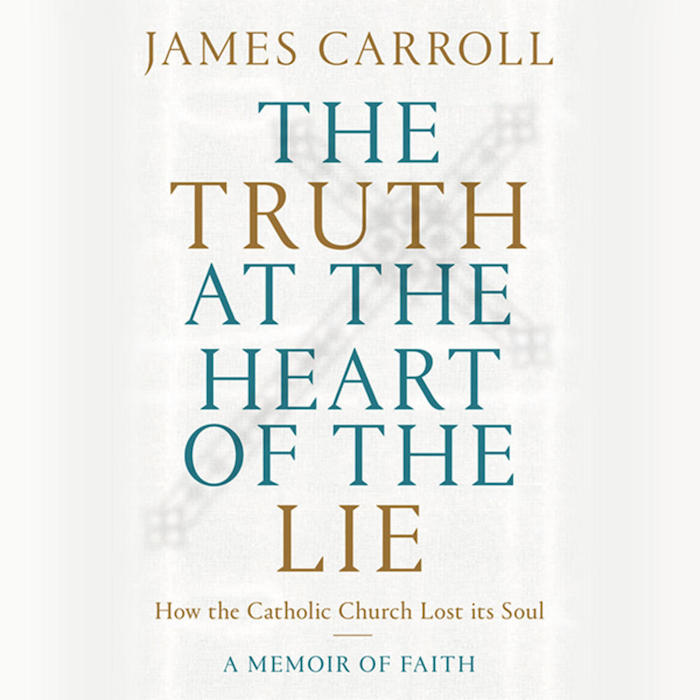

By John Gehring
A new Vatican statement that has provoked widespread criticism for sharply rejecting the blessing of same-sex unions is the latest example of why it’s hard for many people to take the Catholic Church’s own professed values of equality and dignity seriously.
The decree, which notes God “cannot bless sin,” reiterates traditional Catholic teaching on sexuality. But the outpouring of painful reactions demonstrates the limits of Pope Francis’ welcoming gestures toward LGBTQ people and is a stark reminder that my church continues to deny people their full humanity. Straight Catholics who love our church and LGBTQ friends and family in equal measure are finding it increasingly difficult to square the church’s often contradictory messages.
The Catholic catechism insists gay people should be treated with dignity and “every sign of unjust discrimination” should be avoided. This is the same church that, in a 2003 Vatican statement, said allowing children to be adopted by same-sex couples “would actually mean doing violence to these children.” The same church that has promised to welcome and accompany gay Catholics is now opposing the Equality Act in Congress, which would ban discrimination against people based on sexual orientation and gender identity. And in a U.S. Supreme Court case that will be decided this summer, Catholic Social Services in Philadelphia wants to continue operating as a government contractor and receive city funding while refusing to place foster children with same-sex couples.
It’s a strange and un-Christian form of love that tells people they are equal in God’s eyes but then acts in ways that deem their committed relationships and parenting as inferior.
The Vatican’s latest statement is likely to cause spiritual and psychological damage to young LGBTQ people who already experience higher rates of suicide, and push more people away from the institutional church. This statement stings even more coming after what has felt like, for many LGBTQ Catholics, a shift with Pope Francis toward more welcoming and inclusive language.
“Not since the anger over sex abuse in 2002 and 2018 have I seen so many people so demoralized, and ready to leave the church,” tweeted the Rev. James Martin, a prominent Jesuit priest and advocate for LGBTQ Catholics who has met with Pope Francis and serves as a Vatican adviser. “And not simply LGBT people, but their families and friends, a large part of the church.”
Perhaps a necessary reckoning over how the church thinks about LGBTQ people and human sexuality is arriving. Belgian Bishop Johan Bonny of Antwerp said the Vatican statement left him with “intellectual and moral incomprehension.” In a commentary published in several Belgian and international newspapers, the bishop apologized for those who found the decree “painful and incomprehensible.”
The bishop noted that he knows same-sex couples “who are legally married, have children, form a warm and stable family and actively participate in parish life. I’m immensely appreciative of their contributions.”
Archbishop Mark Coleridge, president of the Australian Bishops’ Conference, told The Tablet, a weekly Catholic journal, the statement “isn’t by any means the end of the conversation. I think it should give greater impetus to another kind of conversation about inclusion.” Even the Vatican statement, which in part came as a response to German bishops involved with ongoing discussions about blessing same-sex couples, cites the “positive elements” of gay relationships and acknowledges they should be “valued and appreciated.”
Several U.S. Catholic bishops in recent years have made efforts to show greater welcome toward LGBTQ people. After the 2015 Supreme Court decision legalizing same-sex marriage, Chicago Cardinal Blase Cupich called for “real, not rhetorical” respect for gays and lesbians. Newark Cardinal Joe Tobin welcomed a pilgrimage of LGBTQ Catholics to the city’s cathedral in 2017. San Diego Bishop Robert McElroy has said the church’s description of gay sexual intimacy as “intrinsically disordered” is “very destructive language that I think we should not use pastorally.”
LGBTQ Catholics and allies will continue to remind our church that until there is real discernment about how a disordered theology that excludes and wounds is never holy, welcoming rhetoric rings hollow. Catholic leaders can begin by showing more humility. The hierarchy does not have a monopoly on truth when it comes to the complexities of gender and human sexuality. Reform and renewal first begin by listening — and acknowledging you have something to learn.
Complete Article ↪HERE↩!
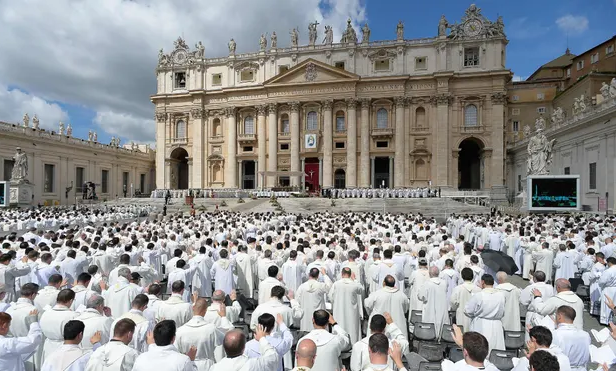
More than 230 professors of Catholic theology in Germany and other countries where German is spoken have signed a statement protesting the Vatican’s recent pronouncement that priests cannot bless same-sex unions, adding to dissent over the document.
The statement issued Monday declared that last week’s text “is marked by a paternalistic air of superiority and discriminates against homosexual people and their life plans.”
“We distance ourselves firmly from this position,” it added. “We believe that the life and love of same-sex couples are not worth less before God than the life and love of any other couple.”
The document released a week ago by the Vatican’s orthodoxy office, the Congregation for the Doctrine of the Faith, said Catholic clergy cannot bless same-sex unions because God “cannot bless sin.”
The congregation’s note distinguished between blessing same-sex unions and the Catholic Church’s welcoming and blessing of gay people, which it upheld. The document argued that such unions are not part of God’s plan and that any sacramental recognition of them could be confused with marriage.
It pleased conservatives and disheartened advocates for LGBT Catholics. The German church has been at the forefront of opening discussion on hot-button issues such the church’s teaching on homosexuality.
The professors’ statement, which was drawn up by a working group at the University of Muenster in Germany, said the Vatican note lacked “theological depth” and “argumentative stringency.”
It included signatures from professors in Germany, Austria, Switzerland and the Netherlands.
Complete Article ↪HERE↩!
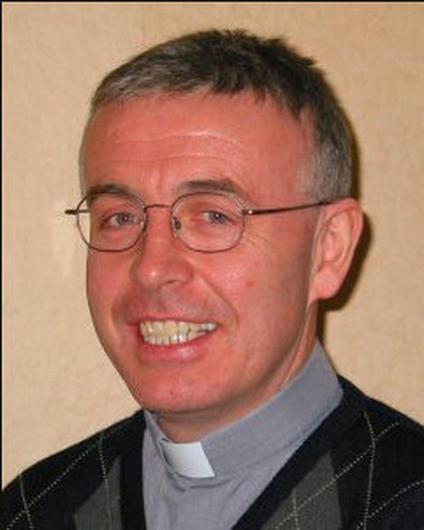
By Vivienne Clarke
A representative of the Association of Catholic Priests, Fr Tim Hazlewood, has said he would bless the union of same-sex couples despite the Vatican ruling it out this week, saying the church ‘cannot bless sin’.
“If Christ was with us now, he would do the caring, the loving thing,” Fr Hazelwood said.
Earlier this week, the Vatican decreed that the Catholic Church cannot bless same-sex unions because God “cannot bless sin”.
The Vatican’s orthodoxy office, the Congregation for the Doctrine of the Faith, issued a formal response to a question about whether Catholic clergy can bless gay unions.
The answer, approved by Pope Francis, was “negative”.
Fr Hazlewood, who ministers in a parish in East Cork, said he had been approached by families who have somebody who is in a same-sex relationship.
“Our experience is that they are lovely couples and to hear something like that, that their relationship is sinful, I wonder how many of them know and meet and interact with those families and those people,” he told RTÉ Morning Ir
Fr Hazlewood said the Pope was in a difficult position, but to listen to that statement was “so disappointing, it was appalling.”
“He’s trying to hold all the parts together, in parts of the world, including Ireland, there is a small group who are very anti-Pope Francis and anti the changes, the new breath of life that he’s bringing.”
“For a lot of people and families, it’s very disappointing. Does he want to cause a schism in the church?”
When asked if he would bless a same sex couple’s union, Fr Hazlewood replied: “Just two days ago there were pieces of weed that grow in the ground and I blessed them. I blessed shamrock, now if two people stand in front of me and they love each other and they are committing to each other for the rest of their lives and I bless shamrock and wouldn’t bless them. I don’t think there’s a doubt or a question there.”
The church’s teaching on what marriage means has not changed, he said.
“In Ireland, we’re going to have a synod in the next five years and the bishops have said they want people on the margins to be part of that, would any gay person come near a church that says things like this?”
“There’s an awful difference between somebody in Rome making a promulgation and what’s the lived experience of the church and I think a lot of priests would say ‘if Christ was here with us now, what would Christ do?’
“He would do the caring, the loving thing. He was the one who challenged all of these rules himself. Pope Francis is asking us to talk about these things, this is the way forward”
“There’s going to be an awful lot more things like this in the church which is a good thing.”
Complete Article ↪HERE↩!

BY James Finn
In a story from Axios, I learned Pope Francis and the Catholic Church have once again morally condemned me and most of the people I love, instructing priests to stop (or not to start) blessing same-sex unions — a practice that until yesterday was finding currency in more liberal Catholic quarters.
The story gets worse from there.
The details of the pronouncement are bad enough, but the bigger story is the journalistic environment in which they’re being reported. From the beginning of Francis’s papacy, major media have bent over backwards to find reasons to paint him as progressive on LGBTQ matters when regressive is a more fair description of his LGBTQ teachings and practices.
Journalists even in the most left-leaning publications often practice classic bothsidesism that paints a distorted picture of how Francis’s Church actually treats LGBTQ people, who mostly experience the Roman Catholic Church as an agent of oppression and stigmatization.
I belong to a large Irish-American Catholic clan, and I’ve heard my own progressive-ish nieces and nephews latch on to inaccurate news reporting that allows them to feel better about the Church they support and — this is critical — lulls them into a complacency that almost guarantees they will not pressure the Church to reform itself.
That Axios headline was clear and accurate: “Priests can’t bless gay unions because God “cannot bless sin.” Ireland’s RTE, a national public news service, broke the story down in more depth. Besides nixing blessings for gay couples, The Congregation for the Doctrine of the Faith (CDF) has ruled that priests must restrict individual blessings to “persons with homosexual inclinations who manifest the will to live in fidelity to the revealed plans of God as proposed by Church teaching.”
In other words, the Church demands celibacy in exchange for inclusion.
The ruling explicitly calls gay people disordered and sinful, spelling out that gay people are fine with the Church only so long as we never form intimate sexual relationships, a basic human need. With this document, the Church continues a tradition of religiously bullying members of gender and sexual minorities by inaccurately reducing our identities and innate biology to pathology.
Despite that, the CDF authors maintain their position constitutes the “respect and sensitivity” the Catechism requires. In Orwellian doublespeak typical of Francis, they claim their ruling is not a form of the “unjust discrimination” the Catechism forbids.
In fact, with Francis’s explicit authorization, this ruling affirms all the Church’s traditions that stigmatize and morally condemn LGBTQ people. For Catholic progressives hoping for the reform of Church teachings, Monday’s ruling dashes hopes.
Does Francis intend to reform the Church?
The document he just approved demonstrates his implacable opposition to reform. It’s harsh, authoritarian, dehumanizing, and damaging to real human beings all over the world. It gives Catholic clergy and lay leaders all the tools they need to continue condemning and pathologizing LGBTQ people.
Check out this New York Times sub-header: “In a ruling made public on Monday, the Vatican said the Roman Catholic Church should be welcoming toward gay people, but not their unions.”
That sentence is fundamentally inaccurate, even outright misleading.
It’s a perfect example of looking for two sides to a story even when one of those sides is barely true. Sure the CDF document calls for “welcoming,” but it explicitly instructs priests not to be welcoming — to withhold ordinary blessings from gay people in partnerships, to teach those gay people that they are living “in sin.”
You can dig into that Times article and get some good information, though you’d have to dig hard, and you would not find the critical piece about banning individual blessings. The Times chose not to report that, even though it’s perhaps the most important part of the story.
The Washington Post did a slightly better job, but their lede is as inaccurate and misleading as the Times’ sub-header: “Pope Francis has invited LGBT advocates to the Vatican. He has spoken warmly about the place of gay people in the church. He has called for national laws for same-sex civil unions.”
Seriously? That’s the lede? That’s neutral journalism?
It gets worse. Look how they report on individual blessings: “The decree said individual gay people could continue to be blessed by the church, provided they show ‘the will to live in fidelity to the revealed plans of God as proposed by Church teaching.’”
If the reader blinked, they missed that the Church just ordered priests to stop blessing individual gay people who aren’t celibate. This story is much more detailed than the one in the Times; it contains some accurate information. It frankly confronts the issue of gay Catholics feeling betrayed. But it uses classic bothsidesism to paint a more positive picture than exists on the ground. Nobody reading the story would conclude that the Church under Francis has regressed on LGBTQ inclusion, even though it has regressed substantially.
Reading the Times, the Post, or most mainstream newspapers, the reader would have missed something profoundly important: Francis often makes kind-sounding personal observations about LGBTQ people but has done nothing to translate those observations into policy. His specific actions have more often been regressive, and his statements have often been misleading.
The Catholic Church is in crisis, shrinking in the western world so fast some analysts call the trend an implosion. In former monolithic Catholic strongholds like Ireland and Quebec, the Church no longer plays any significant cultural role. Around the world, from the United States, to Argentina and even Italy, Church attendance is falling fast, precipitously fast among young people.
Most of those young people cite harsh teachings and practices about LGBTQ people as one reason for seeking spiritual succor outside the Roman Catholic Church. Pope Francis and the Vatican have powerful motives to mislead about their deeply unpopular values. That’s understandable, but the Press ought to hold them to account.
It’s funny how mainstream news sources hold Evangelical leaders like Franklin Graham and Pat Robertson up to barely concealed scorn, usually reporting their anti-LGBTQ practices and teachings accurately. It’s funny, because Pope Francis’s theology is every bit as harsh, yet the Press is consistently kind to him, seeming visibly to cooperate to make his harsh, stigmatizing theology appear “kindler and gentler.”
Granted, they’re following his lead, but that doesn’t justify bad reporting.
In the United States alone, where bishops are very conservative, LGBTQ people trying to be included in Catholic spiritual communities are regularly shamed and shunned.
The details include teenagers bullied at school by administrators, blackmailed into unwanted counseling, and forced into conversion therapy. LGBTQ and allied teachers and administrators are fired in witch hunts. Music leaders lose their jobs after decades of faithful service. LGBTQ support groups are forced out of Church-owned buildings. Every day, Catholic leaders teach and show people that queer folks are second class and deserving of punishment
Around the world, the situation is even worse. Catholic bishops have incited anti-LGBTQ violence in places like Poland and Ghana. The Church is inarguably perpetuating and strengthening anti-LGBTQ sentiment. But the Press reported none of that yesterday.
That story about gay civil unions is a story of oppression. It’s a story about a religious institution working to deny real civil marriage to same-sex couples, about an institution working to stop same-sex couples from raising children together.
You’d never know that browsing the Times or the Post — or almost any other major newspaper — because just like yesterday, the Press framed “both sides” of an issue that is deeply and factually one-sided. That paradigm has to change. It’s not the Press’s job to make excuses for a deeply toxic, unapologetically homophobic institution.
When the Press does that, they strengthen homophobia by normalizing it.
The only hard-hitting press coverage I’ve seen of yesterday’s story about gay people being sinful comes from the Washington Blade, a newspaper that focuses on LGBTQ issues.
The Blade reached out to Juan Carlos Cruz, a gay Chilean man and a survivor of clergy sex abuse who met with Francis at the Vatican in 2018. Cruz had harsh words of truth for the Pope and the rest of the Vatican hierarchy. He compared the CDF to Tomás de Torquemada, who spearheaded the Spanish Inquisition from which the CDF is descended. Cruz called for immediate change in Vatican leadership:
The Congregation for the Doctrine of the Faith and especially its prefects are completely in a world of their own, away from people and trying to defend the indefensible. We see it in this quest to annihilate LGBT people, in the slowness with which the crimes of abuse are dealt with, their inhumanity in their awareness of people’s suffering so contrary to Pope Francis who I don’t know why he allows such inhumane and self-interested people in charge.
Francis will likely never hear Cruz’s angry, anguished words. He’ll likely never hear a chorus of outraged, anguished LGBTQ voices condemning him for his toxic, inhumane teachings and practices.
Most people will never hear those voices, because mainstream press won’t amplify them.
Laila Lalami observed in The Nation a couple years ago that bothsidesism “poisons America” by giving people too busy to thoroughly read news coverage a false impression of current events. When journalists bend over backwards to create balance where little exists, they do great harm.
That’s happening right now with Pope Francis, and it’s time for it to stop. It’s time for my nieces and nephews to stop finding excuses for the inexcusable dished up on silver platters. It’s time for them to feel deeply uncomfortable about the Church they support — so they can help reform it.
Knowledge is power.
It’s time for journalists to report on Francis as accurately — and as harshly — as they report on Evangelical leaders with beliefs almost identical to his.
Complete Article ↪HERE↩!
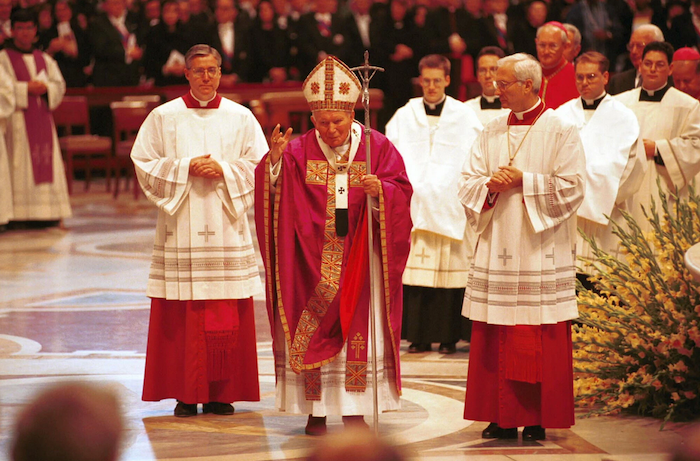
At the funeral of Pope John Paul II at St. Peter’s Square, banners rose from the sea of mourners reading “Santo Subito,” or “Saint at Once.” He was a giant of the church in the 20th century, spanning the globe, inspiring generations of believers with his youthful magnetism, then aged infirmity, and, as the Polish pope, he helped bring down Communism over his more than 26-year reign.
Days after his death in 2005, cardinals eager to uphold his conservative policies had already begun discussing putting him on a fast track to sainthood while devotees in Rome and beyond clamored for his immediate canonization, drowning out notes of caution from survivors of sexual abuse and historians that John Paul had persistently turned a blind eye to the crimes in his church.
Now, after more than a decade of doubts, his reputation has fallen under its darkest cloud yet, after the very Vatican that rushed to canonize him released an extraordinary report this week that laid at the saint’s feet the blame for the advancement of the disgraced former prelate Theodore E. McCarrick.
The investigation, commissioned by Pope Francis, who canonized John Paul in 2014, revealed how John Paul chose not to believe longstanding accusations of sexual abuse against Mr. McCarrick, including pedophilia, allowing him to climb the hierarchy’s ladder.
The findings detailed decades of bureaucratic obfuscation and lack of accountability by a host of top prelates and threatened to sully the white robes of three popes. But most of all, critics say, it provides searing proof that the church moved with reckless speed to canonize John Paul and now it is caught in its own wreckage.
“He was canonized too fast,” said Kathleen Cummings, author of “A Saint of Our Own” and the head of a center on U.S. Catholicism at the University of Notre Dame. She said that given the “really damning evidence,” in the report, had the church waited at least five years, and not mere days, to begin the canonization process “it would probably not begin for John Paul II because of his complicity in the clergy sex abuse scandal.”
A reversal of the canonization, which historians struggle to recall ever happening, is implausible. Some historians say the McCarrick report is more likely to put back some brakes on a process that John Paul II himself sped up. But the report may complicate the canonization chances of others at the top of the church hierarchy during the late 20th century and early 21st century, when the scourge of sex abuse exploded in the church.
The Vatican report shows that Pope Benedict XVI told Mr. McCarrick to keep a low profile when more allegations of abuse emerged in 2005. Pope Francis, despite hearing rumors of the abuse from his top lieutenants, trusted that his predecessors had properly vetted the case and left it alone, the report found.
Francis has acknowledged his own failures in believing bishops over victims. He removed Mr. McCarrick from the priesthood and has in recent years instituted new church policies to increase accountability.
Many church experts consider those new rules corrections to the abuses and almost willful ignorance of church leaders that occurred under John Paul II.
John Paul II’s defenders say the report only demonstrated that Mr. McCarrick deceived the pope, as he did many others over his half-century rise to the highest ranks of the Catholic Church, and that it has no bearing on the heroic Christian virtue that made the pontiff a saint.
John Paul had been “cynically deceived” by Mr. McCarrick and other American bishops, Stanislaw Gadecki, the head of the Polish bishops conference said in a statement.
“Saints make errors of judgment, this was clearly an error of judgment,” said George Weigel, a biographer of Pope John Paul II and an official witness during his beatification process. “McCarrick was a pathological liar. And pathological liars fool people including saints.”
Mr. Weigel said that if perfection were a prerequisite for sainthood, St. Peter himself would not have made the cut. Indeed, infallibility, which is sometimes attributed to popes, is not a necessary saintly attribute, and history is full of saints who were not exactly saints during their lifetimes.
There has been a satanic priest, prostitutes, thieves and much else on the road to redemption and sainthood. In 1969, Pope Paul VI removed 93 saints from the church’s universal liturgical calendar, but mostly because they might not have existed, such as St. Christopher, who carried on his shoulders an infant who with each step grew heavier with the weight of the world.
But much is known about John Paul II, and some critics are arguing that it is enough cause not to celebrate him.
Citing John Paul’s “calamitous, callous decision-making,” which it said put children around the world at risk, an editorial Friday in the National Catholic Reporter urged American bishops meeting next week for their annual conference to “discuss requesting that the Vatican formally suppress John Paul’s cult,” or cease celebrating him. “Abuse victims deserve no less.”
That is a tremendous irony for a pope who turned the church into an efficient canonization factory. John Paul knocked down the criteria for beatification from two miracles to one, and did the same for canonization. In 1983, he reduced the amount of time required between a person’s death and the start of their canonization process to five years from 50.
He produced more than 480 saints, and put enough into the pipeline that Benedict XVI was able to canonize scores more. Pope Francis has followed suit, but has chosen to canonize people closer to his more pastoral, and less doctrinaire, vision of the church, such as Pope Paul VI and the martyred Salvadoran Archbishop Óscar Romero.
All three of the popes embraced the canonization process as a tool to fortify the faithful with the notion that saints are still among us, but also as mission statements for who merits emulation. Given the ideological divisions in the church, that approach puts a premium on speed.
“A process normally begins after five years of the death of the Servant of God and not later than 30 years after his death,” the Rev. Pascual Cebollada, the postulator, or person who presents a case for canonization, for the Jesuit order, explained. “For the last condition there are, of course, many exceptions that must be justified. For the first,” he added, “there have been less exceptions.”
John Paul was one of them. Benedict XVI waived the five-year requirement, allowing his canonization case to begin only days after his death. Even before the McCarrick report’s release on Tuesday, there was a growing sense that might have been a mistake.
In May, reporters asked Msgr. Slawomir Oder, the promoter of the cause for John Paul’s sainthood, whether it would have been wiser to hold off on the canonization. Already by that time, a cloud had grown over John Paul’s relationship with Mr. McCarrick and his close ties to the Rev. Marcial Maciel Degollado, the Mexican founder of the wealthy and powerful religious order Legionaries of Christ, who was later found to have fathered several children and been a serial abuser.
“All questions were faced, even the ones you are talking about” concerning abuse, Monsignor Oder said. He added that “John Paul II did not cover up any pedophile.”
But Monsignor Oder, who did not return a request for comment after the report’s publication, also said at the time that the Vatican did not grant direct access to the archives to those investigating the case for John Paul’s canonization, and that the Secretariat of State researched their questions and provided answers.
Archbishop Carlo Maria Viganò, a former official in the Secretariat of State who became the Vatican’s ambassador to the United States, in part prompted the report by publishing a remarkable letter in 2018 that accused Pope Francis of having covered up Mr. McCarrick’s abuse.
To shield John Paul II, who was actually in power at the time of Mr. McCarrick’s promotions, Archbishop Viganò argued that the ailing pontiff was too sick with Parkinson’s in 2000 to be held accountable.
But the Vatican investigation, which Archbishop Viganò said did not interview him, says that John Paul was of sound mind when he personally made the decision to reject the accusations and appoint Mr. McCarrick.
“The record unequivocally shows that Pope John Paul II made the decision personally,” the report says, and quotes the testimony of the former prefect of the papal household, James Harvey, saying John Paul was “fully capable to make all of his own decisions in 2000.”
The more frequent defense of John Paul, expressed also in the report, is that his experience facing Communism in Poland led him to believe that false accusations against priests and bishops were a political weapon against the faith.
But the reports give a rare glimpse at other, less noble, factors that led the pope to believe Mr. McCarrick, namely that the Vatican operated like an old boys network where bishops always got the benefit of the doubt.
John Paul first met Mr. McCarrick in 1976. Mr. McCarrick, the report says, “was on a fishing trip in the Bahamas with teenagers from some of the Catholic families” when a telegram told him to come back immediately to help translate for Pope John Paul II, then known as Karol Jozef Wojtyla, a rising star in the church. Mr. McCarrick joked that Cardinal Wojtyła had ruined his vacation and they struck up a friendship.
A quarter of a century later, Mr. McCarrick urged John Paul in a letter not to believe the accusations against him.
Pope John Paul II became “convinced of the truth” of McCarrick’s denial, the report notes, adding that Stanislaw Dziwisz, now a Cardinal, recalled that Pope John Paul II also believed it would be “useful to nominate McCarrick to Washington because he has a good relationship with the White House.”
Those events, as well as others in the report, have led some historians to suggest that the church redirect its canonization energies away from the top of the hierarchy.
“You are pope,” Professor Cummings said. “That should be good enough.”
Complete Article ↪HERE↩!